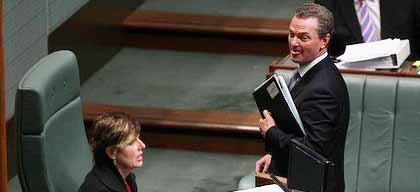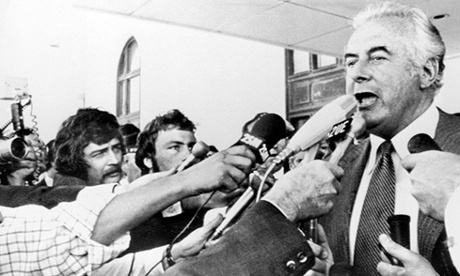Abbott and Forrest’s assault on Indigenous land rights

welfare reviewer has been involved in a long running dispute over the
legitimacy of mining leases held by his company Fortescue Metals over
half the Yindjibarndi tribal country in Western Australia.
The iconic 1976 Land Rights Act is under attack like
never before under the Abbott Government, writes former Fraser Liberal
Government Minister for Aboriginal Affairs Ian Viner AO QC (via Northern Land Council – Northern Edition).
WITH the Commonwealth Government’s push for 99-year leases, the Forrest Review’s call for Aboriginal land to be privatised so as to be bought and sold, and attacks upon the Northern Land Council
in particular over their defence of traditional ownership and their
responsibilities under the Land Rights Act, the iconic 1976 Land Rights Act is under threat like never before.
The whole framework and security of traditional Aboriginal land, protected by the Land Rights Act,
is in danger of being subverted by Governments, bureaucracies and
people who have no real understanding or sympathy for traditional
communal land ownership.
99-year town leases turn traditional ownership upside down.
In reality, they put the Commonwealth back into ownership and control of traditional Aboriginal land like it was before the Land Rights Act was passed as if Aboriginal land had returned to reserve status under Commonwealth control.
No one can really imagine that in 99 years time the Commonwealth
will, or could, return to the people absolute ownership of traditional
land that had been alienated by these 99-year leases.
A Commonwealth Head Lease
is a device by the Commonwealth to take control of Aboriginal land away
from traditional owners. It is thoroughly misleading for the
Commonwealth to suggest giving the Office of Township Leasing a 99-year lease of Aboriginal land is the same as 99-year leases in the Australian Capital Territory (ACT).
The ACT leases Crown land to people instead of granting freehold
ownership. Aboriginal traditional owners already have freehold title —
the best form of ownership in Australia.
There is good reason to think the Commonwealth devised 99-year leases and the Office of Township Leasing
as the head lessee as a way to avoid having to compensate Aboriginal
people on just terms under the Constitution for taking control of their
traditional lands.
The Commonwealth objective is the permanent alienation of traditional
land from Land Trusts. While no-one knows what the future of Australia
will be in 99 years, we can all be sure that Northern Territory
Aboriginal people will not have the power at the end of a 99-year head
lease to demand the return of the land to them, like China demanding
that colonial Hong Kong to be returned from the British.
The bureaucratic regime of the Office of Township Leasing is really a
Canberra-controlled bureaucracy of public housing. Aboriginal people
will have lost control of their own land once it gets into the hands of
the Office of Township Leasing. Land Trusts will become token names only on the title deed. The real legal authority will be the Commonwealth as Head Lessee forever.
The Forrest Review recommendations make it plain that the objective
of Commonwealth land tenure reform policies in the Northern Territory
should be to smash traditional ownership by making Aboriginal land
“tradeable and fungible” as it says in Chapter 8. History tells us that land grabbers will quickly move in and Aboriginal land will be traded away forever and Aboriginal people left on the fringe once again.
The real objective of Commonwealth policy should be to put the
Aboriginal people in control of their own destiny for the next 99 years.
Keeping Aboriginal land firmly under Aboriginal control is the only way
for that to happen.
Northern Territory Aboriginal people should learn from Maori history in New Zealand.
Although the 1840 Treaty of Waitangi was supposed to protect Maori traditional land, New Zealand governments quickly and systematically started breaking up communal title and Maori control
of their traditional lands by “individualising” land titles into
private ownership until there was no traditional Maori ownership or
control left over their historic lands.
Maori suffered more than 150 years of social degradation and discrimination as a result. I invite people to read the 1996 Waitangi Tribunal report entitled, The Taranaki Report, Kaupapa Tuatahi.
It is a sad story and a still sadder indictment of government and an
indication of what could happen to traditional ownership in the Northern
Territory.
There is much talk of communities being consulted about leases before a 99-year Head Lease is taken by the Commonwealth.
Experience tells us that such consultation is an empty gesture.
Government and the bureaucracy go ahead doing so many things when all
there has been is fly-in-fly-out so-called consultation with a minority
of a community. That was rampant under the Intervention and Stronger Futures.
When it comes to giving up your ownership of traditional land, it is
consent that is required, not consultation. Consent can only be given
when what is proposed is really understood and real consent is given.
Unless there is real consent, agreeing to a 99-year lease is not
voluntary. Consultation becomes coercion. So-called consent becomes
deception.
Land Trusts and communities, as a group, have a right to be
independently legally advised what the granting of a Head Lease to the
Commonwealth really means. Land rights is complicated. Land ownership
anywhere in Australia is complicated for any citizen. Land Trusts and
communities have a right to be fully funded to receive all the
independent legal and social advice they want before being called upon
to consent to give up ownership of historic lands.
Land Councils have strict legal obligations under the Land Rights Act and every right to be extremely careful to ensure the Act
is being thoroughly complied with before a lease is granted. The
Commonwealth cannot complain if a Land Council is performing its
statutory obligation to the highest degree necessary.
Indeed, there is a powerful argument that the Land Rights Act
imposes a fiduciary duty upon the Commonwealth and Land Councils to act
in complete good faith toward Land Trusts, traditional owners and
communities living on traditional land before the Commonwealth takes any
lease from them — 99 years, 40 years or any other lease period.
It is easy to foresee that with the strict requirements of the Land Rights Act
and the duty upon the Commonwealth and Land Councils to act in complete
good faith there will be years of litigation challenging the legality
of 99-year leases like another Mabo case if the Commonwealth tries to force their policies upon reluctant Aboriginal communities.
The truth of the matter is that the grant of 99-year leases to the Commonwealth is not necessary.
The Land Rights Act expressly has provision for the grant of
leasehold interests in traditional lands under conditions, which
preserve the traditional ownership of the Land Trusts and the in-built
protections of the Act. The Commonwealth and Northern Territory
Governments can fund public housing, facilities and infrastructure
without demanding 99-year leases.
It is wrong of the Commonwealth to promise funding for community
infrastructure, including public buildings and housing only on condition
of the handing over of 99-year leases. That is coercion or bribery no
better than the exchange, colonial-style, of “beads and bangles” by
which Indigenous people around the world were deprived of their
traditional lands. Those days should have long passed out of Government
thinking and policies.
The situation is worse when it is understood that the money the
Commonwealth promises to spend if a community agrees to a 99-year lease
will be the Aboriginal people’s own trust money taken from the Aboriginal Benefit Account (ABA). That really is a smoke and mirrors promise.
In fact, the time has come, with the 40th anniversary of the Land Rights Act only two years away, for the Land Rights Act
and the ABA to be put completely in Aboriginal hands with authority and
accountability under common and statute law like all other citizens and
corporations. Get rid of the discrimination of Ministerial and
bureaucratic control over Aboriginal lands and money paid for the
exploitation of those lands.
Only in that way will the Northern Territory Aboriginal people, the
traditional owners of their historic lands, and the communities which
live on them, have some hope of stopping the Commonwealth constantly
altering the Land Rights Act, eating away at the protections
originally designed in the Act to prevent exploitation and alienation.
The Commonwealth needs to take a step back from present policy in the
Northern Territory. Governments of all political colours should start
treating Aboriginal people, their lives and their lands with dignity and
respect for the capacity to know what they want for their own futures.
Land Councils, traditional owners and communities need to come together to protect the legacy of the Land Rights Act, stand firm under their own leadership, and decide for themselves the way forward.
Ian Viner
AO QC was Minister for Aboriginal Affairs during the implementation of
the Land Rights Act in 1976. This piece was originally published in the Northern Land Council – Northern Edition and has been republished with permission.








